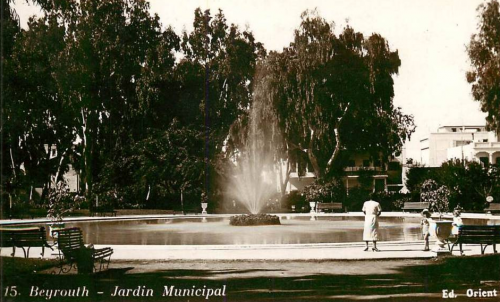
This article is a sequence of vignettes. Each vignette emphasizes one specific idea and can be understood on its own but is also part of something bigger than itself.
**
The second half of the 19th Century was difficult for the Sick Man of Europe.
The Ottoman Empire and its peoples were facing socioeconomic hardship and political turmoil. When the Ottoman Sultan signed the first of a series of many decrees to reform state and society, the Empire was already caught in the throes of colonial ambitions and rising nationalism, and facing the consequences of its unavoidable participation in the exchange of people, goods, money and ideas.
Among other things, these Tanzimat – modernizing reforms – had a striking impact on public health and led to the creation of institutions, such as the maritime quarantine – known as Quarantina – and the sanatorium[i] of Bhannes, concerned with the well-being of individuals and communities alike.
**
The decline of the sanatoria began with the discovery of antibiotics and many, like the Sanatorium of Bhannes, were transformed into general hospitals. Patients diagnosed with tuberculosis were thus treated with antibiotics such as Iproniazid, a molecule that prevented an enzyme - the monoamine oxidase - from breaking down a specific category of neurotransmitters - the monoamines, which were chemical compounds that transported messages in the brain.
Upon taking this drug, patients often experienced euphoria. It did not take long for researchers from the pharmaceutical industry to notice and investigate this further. The Monoamine theory they developed suggested that these neurotransmitters spread messages of biological happiness in our brains.
**
Knowledge does not exist in a vacuum. The way it is produced, disseminated and then used is a manifestation and an expression of a belonging to a larger worldview.
Knowledge is generated and then translated in response to the needs of the class or the group to which its producer belongs. Although some discoveries happen by chance rather than intentionally, the way they’re used is not.
For example, researchers identify a potent chemical compound that could be used to treat illnesses in humans. The journey from chemical compound to medicine is a lengthy and intricate process, often shaped by political, economic and social forces. Moving from the creation/invention of the drug to its prescription and its purchase by the patient entails the scientific and technical production of the drug, its pricing and regulatory framework, from marketing authorization to prescription policies and its promotion and distribution.
Global and local forces, politics, the law, culture and mores, the economy and the labor market to name a few shape the way medicine and the pharmaceutical industry respond to illness. In turn, they are also shaped by these very same responses.
These forces play a considerable role in the way we view, diagnose, treat and address mental illness. The discovery of the Monoamine theory was fortuitous but it influenced the onset and the course of an illness and fueled an entire industry: depression and the anti-depressants.
**
When the Ottoman Empire entered the global market, many families from Syria and Mount Lebanon became traders working between Beirut, Damascus, Baghdad and Tehran, selling and distributing European and, later on, American brands including medicine.
Throughout the years-civil wars and post-war reconstruction and development plans included-trade in Lebanon retained its prominence. It is still today an important pillar of the economy. Local pharmaceutical industry is underdeveloped, local production poor and reliance on importation remarkably high. There are only six pharmaceutical factories in Lebanon (Mephico, Pharmadex, Algorithm, Mediphar, Pharmaline, Benta) and their market share of production does not exceed 8%.[ii]
80% of drugs are imported and the global pharmaceutical industry is represented in Lebanon through scientific offices- like Pfizer, Eli Lilly, Lundbeck, Glaxo Smith Kline and Johnson & Johnson - in charge of marketing, communication and pharmaco-vigilance[iii] and through importation agents that deal with the manufacturers and import products and medicine and distribute it in the country.
Many of these importers are the descendants of the same families that started the trade business over a century ago. A small group of importers control the majority of local markets in a way that comes to resemble exclusive monopolies - although the exclusive right to import food and medicine cannot be granted by the law. A consequence of this quasi-monopoly endows importers with powers. Sometimes, they do not inform the Ministry of Public Health of price change in the country of origin of the drugs they import; they decide to discontinue importation when the profit margin is not very significant; and they replace a drug that is cheap with one that is more expensive.
According to figures from the Lebanese Customs, in 2014, Lebanon imported $1.1 billion in pharmaceutical products[iv]. Here’s a math problem: if 10 companies control 90% of the market and 4 of these companies control 50% of the market, then how much profit do these companies make?
**
In studying the relationship between social classes and political power, Fawwaz Traboulsi recalls the government of Lebanon’s attempt to join the World Trade Organization under Rafic Hariri’s leadership in the early 2000s. The WTO’s terms stipulated the liberalization of the economy and the end of monopolies in trade and importation.
Because of the modern history of trade in the region and Europe’s longstanding relationship to the minorities, many importers are Christian. The debate over Hariri’s proposed economic reforms back then took a sectarian turn. Some saw in it an attempt by Muslim businessmen to hijack the rights and privileges of Christian importers. The Patriarch of the Maronite Church and General Michel Aoun – still in exile at the time – even accused Syria of trying to jeopardize the economic independence of the Lebanese State.
**
There are almost no laws in Lebanon to regulate drug promotion and advertising to health professionals. Physicians are almost free to prescribe anything they want and pharmaceutical companies heavily influence medical education and conferences.
In 2016, the Ministry of Public Health introduced the Lebanese Code of Ethics to try and regulate pharmaceutical promotion as well as a unified prescription form for physicians. This form could eventually be collected by the Ministry and could provide valuable data to better understand what doctors prescribe, to whom and why.
**
There are radical and effective ways to address the hyper-medicalization and privatization of healthcare in Lebanon, especially in regards to mental illness.
To think globally, to take into account worldwide trends but to act locally;
To recognize that there is an oligarchy and private interests at stake at the expense of our own well being;
To push for a comprehensive public health policy that ensures accountability of all actors involved in the provision of healthcare beyond the corporatism of the professional orders (of physicians, pharmacists, etc.) and syndicates (private hospitals);
To curtail pharmaceutical promotion especially of psychotropic drugs, not only to psychiatrists but also gynecologists;
To collect and make available comprehensive data of pharmaceutical sales, prescriptions and prescribing habits of medicine;
To create a new political imaginary where a different, healthier, good life is possible for all.
[i]A medical facility for the treatment of long term illness, notably tuberculosis
[ii]SUKKARIEH, Ismail, Al dawaa’... mafia am azmat nithaam? (Pharmaceuticals: a mafia, or a system in crisis?), Part 1, Dar AL Farabi, Beirut, 2010
[iii]The monitoring of the effects of the drugs after they have been released on the market (especially to evaluate side effects)
[iv]Waiting for Reforms. Executive Magazine. 2015. (http://www.executive-magazine.com/economics-policy/healthcare-waiting-fo...)
Publisher:
Section:
Category:






